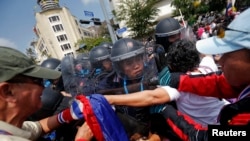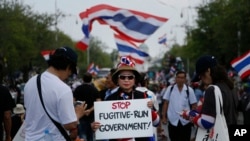BANGKOK —
At least four people were killed and dozens injured as Thailand's government security forces moved to clear anti-government protest sites in Bangkok. The clashes came as the National Anti-Corruption Commission (NACC) called on Prime Minister Yingluck Shinawatra to answer questions regarding her role in a controversial rice price support scheme.
Three protesters and one police officer were killed in fighting near Government House. Officials say around 60 people were wounded and about 100 protesters were detained. Police used tear gas, rubber bullets and live rounds to disperse some 2,000 protesters occupying grounds near the official offices of Prime Minister Yingluck Shinawatra. Both sides appeared to be using weapons in the street battle.
Most protesters gave up quietly, but Sunai Pasuk, a senior researcher for New York-based Human Rights Watch told VOA that militants in the group near Government House had M79 grenade launchers and were firing at police.
"Resistance appears to be much more fierce and when police deployed tear gas and rubber bullets the protesters - some of them - responded with live ammunition and also war weapons including M79 grenade launchers leading to one police killed and many injuries and that triggered the street battles between the two sides," Sunai said.
After the firefight police retreated. But the chief of the security operations overseeing implementation of the state of emergency decree, Chalerm Yumbangrung, who is also labor minister, says he will push on with plans to clear the protest sites.
The protests began in mid-January in a campaign by the opposition Democrat Party linked People's Democratic Reform Council (PDRC) to force Yingluck's resignation.
But the government opted to call early elections in February 2, only to see them partially disrupted by PDRC protests with thousands prevented from voting.
Now Yingluck faces fresh challenges over her management of a rice buying scheme that critics say was laced with corruption and lost billions of dollars.
On Tuesday the National Anti-corruption commission, the NACC, announced, following an investigation, it would press charges against her.
Chris Baker, an author and commentator on Thai politics, says the courts are expected to play a key role in determining the Prime Minister's future.
"The movement on the courts and particularly on the counter corruption case against Yingluck that's still very important and that's likely to be an important part of the denouement," he said. "It's quite likely that the sort of facing saving formula for both sides is that while Suthep fails, also that Yingluck has to step back and what's difficult now is finding a formula for doing that and a legal formula for doing that - something that fits within the constitution."
The NACC has called on Yingluck to report on February 27 to acknowledge the corruption charges. The documents being forwarded to the Supreme Court will require the prime minister to step back from formal duties, but not resign until the final verdict.
Three protesters and one police officer were killed in fighting near Government House. Officials say around 60 people were wounded and about 100 protesters were detained. Police used tear gas, rubber bullets and live rounds to disperse some 2,000 protesters occupying grounds near the official offices of Prime Minister Yingluck Shinawatra. Both sides appeared to be using weapons in the street battle.
Most protesters gave up quietly, but Sunai Pasuk, a senior researcher for New York-based Human Rights Watch told VOA that militants in the group near Government House had M79 grenade launchers and were firing at police.
"Resistance appears to be much more fierce and when police deployed tear gas and rubber bullets the protesters - some of them - responded with live ammunition and also war weapons including M79 grenade launchers leading to one police killed and many injuries and that triggered the street battles between the two sides," Sunai said.
After the firefight police retreated. But the chief of the security operations overseeing implementation of the state of emergency decree, Chalerm Yumbangrung, who is also labor minister, says he will push on with plans to clear the protest sites.
The protests began in mid-January in a campaign by the opposition Democrat Party linked People's Democratic Reform Council (PDRC) to force Yingluck's resignation.
But the government opted to call early elections in February 2, only to see them partially disrupted by PDRC protests with thousands prevented from voting.
Now Yingluck faces fresh challenges over her management of a rice buying scheme that critics say was laced with corruption and lost billions of dollars.
On Tuesday the National Anti-corruption commission, the NACC, announced, following an investigation, it would press charges against her.
Chris Baker, an author and commentator on Thai politics, says the courts are expected to play a key role in determining the Prime Minister's future.
"The movement on the courts and particularly on the counter corruption case against Yingluck that's still very important and that's likely to be an important part of the denouement," he said. "It's quite likely that the sort of facing saving formula for both sides is that while Suthep fails, also that Yingluck has to step back and what's difficult now is finding a formula for doing that and a legal formula for doing that - something that fits within the constitution."
The NACC has called on Yingluck to report on February 27 to acknowledge the corruption charges. The documents being forwarded to the Supreme Court will require the prime minister to step back from formal duties, but not resign until the final verdict.





